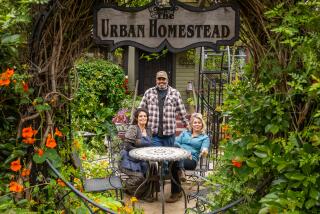Pioneer in Natural Foods : Organic Farm Founder Had 50-Year Head Start
- Share via
PENNS CREEK, Pa. — The seed of an idea was planted in 1939, when Paul Keene, a young missionary to India, met Mohandas Gandhi.
Out of it grew Walnut Acres, one of the first organic farms in the the United States. An oasis of natural foods in a fast-food world, it has blossomed into a $5-million-a-year business since Keene and his wife, Betty, came to central Pennsylvania in 1946 and began raising produce without pesticides or other man-made chemicals.
The 108-acre operation has been expanded to nearly five times its original size, and now yields about 300 products that are sold worldwide. The most popular ones include preservative-free peanut butter, granolas and other unsweetened cereals and freshly ground, whole-grain flours.
The philosophy at Walnut Acres, according to Keene, is that “food should be--is--the most important thing in life, and one should be more concerned about what one eats than anything else.”
Focus on Health
“All joys and all outreach can only be appreciated if you’re healthy and don’t have to worry about your insides and your outsides,” added Keene, who is 78.
George DeVault, editor and publisher of The New Farm magazine published by the Regenerative Agriculture Assn., said that Walnut Acres is considered a pioneer in organic foods.
“I think that in the very near future, that’s going to be the conventional way of farming,” DeVault said. “The chemical-intensive system we have now is not sustainable--the economics, the environment, the health concerns, the residue. . . .
“People like Paul Keene have helped pave the way for a healthier future for all of us.”
Keene’s desire to enrich the lives of others was encouraged by Gandhi, whom he met nearly 50 years ago in British-ruled India. Keene, the Yale-educated son of a minister, had just completed his first year as a missionary there.
Consulted With Gandhi
“I said to him: ‘I’m teaching mathematics in a school in America. I’m here and I’m learning a lot about India, and I’m not satisfied with this work I’m doing. What would you suggest?’
“He said: ‘Well, I can’t advise you on the details, but the first thing you should do when you get back is give away everything you have.’ ”
An inspired Keene returned to the United States in 1940 with his wife, a British missionary’s daughter. He taught one more year at New Jersey’s Drew University before quitting.
The couple spent the next several years studying organic farming at schools that stressed the need to “go back to the soil.” In 1946, they borrowed $5,000 to buy the Penns Creek farm 55 miles north of Harrisburg.
They worked the land without electricity, tractors or insurance. They refrained from spraying their crops or the soil. Within a few years, Walnut Acres, the business, was born.
Profit-Sharing Structure
“We immediately said: ‘Well, it’s not right that we own this whole business and get all the profits.’ So we gave the business away.”
The private, employee-owned business now encompasses 500 acres free of synthetic chemicals and tilled by modern methods, and a full-time staff of 95. Mail-order business has grown 17% in the past year alone, according to Bob Anderson, 43, Keene’s son-in-law and the company’s vice president and general manager.
As business flourishes, so does Walnut Acres’ philanthropy.
About $7,000 to $8,000 in donations from customers and employees will be funneled this year into a community center for tiny Penns Creek, built and run by Walnut Acres Foundation Inc., a nonprofit offshoot.
Another $8,000 will go to a home and school for orphans and unwanted children in India, a cause adopted by the foundation 12 years ago. Last year, $33,500 was raised to add a building to the school in memory of Betty Keene, who died in May, 1987, at 74.
Nature Essays Published
In his “Greetings from the Farm” essays in the bimonthly Walnut Acres catalogue, the lean and energetic founder writes of farming, nature “and the oneness of all life.” The Globe Pequot Press recently released a collection of 59 of them, written over the past 30 years, in a book entitled “Fear Not To Sow Because of the Birds.”
“You don’t see the birds that are going to steal your grain from you,” Keene says. “They need food, too.”
Anderson said people are becoming more interested in diet and nutrition, in part because of Surgeon General C. Everett Koop’s warnings about obesity, cholesterol and the perils of tobacco use. “Going together with this has been a little bit more interest in gourmet foods, and gourmet cooks start looking for purer ingredients,” he said.
“We’re leaders in the field in letting people understand what healthful eating is and what it means,” said his wife, Ruth Keene Anderson, 43, who is secretary and treasurer of Walnut Acres.
‘Organic’ Rules Vary
Although exact figures are not available, experts say that organic food operations make up between 1% and 5% of the nation’s farms. The definition of organic varies from state to state, however, and the confusion has prompted some to call for federal standards.
The U.S. Department of Agriculture in 1980 defined organic farming as a production system that avoids or largely excludes use of synthetic fertilizers, pesticides, growth regulators and livestock feed additives. Organic farmer rely on crop rotation, crop residues, animal manures and mechanical cultivation of the soil.
“There is a need for greater uniformity,” Patrick Madden, professor of agricultural economics at Pennsylvania State University, said.
Vegetables, grains and other crops native to Pennsylvania are grown at Walnut Acres. Rice, nuts, dried fruits and other ingredients are supplied by other organic farms that meet Walnut Acres’ standards.
More to Read
Eat your way across L.A.
Get our weekly Tasting Notes newsletter for reviews, news and more.
You may occasionally receive promotional content from the Los Angeles Times.










